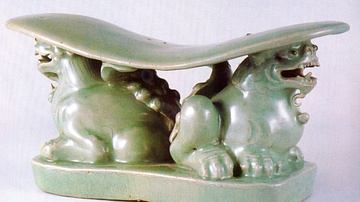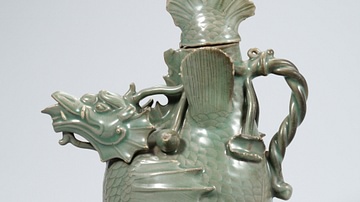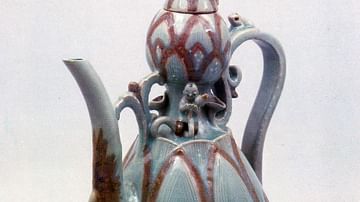Search Images
Browse Content (p. 1376)

Image
Muryangsujeon, Buseoksa, Korea
The Muryangsujeon (Murangsu-jŏn) hall, part of the Buseoksa temple complex, Gyeongsangbuk-do Province, South Korea. Buddhist temples were first constructed at the site in the 7th century CE but the hall dates to the Goryeo (Koryo) period...

Image
Buddha, Seokguram Grotto, Gyeongju
The 3.45 metre high seated Buddha within the Seokguram Grotto, near the Bulguksa Temple of Gyeongju, South Korea. Silla period, 8th century CE. The figure sits beneath a stone hemispherical dome.

Image
Seokgatap Pagoda, Gyeongju
The Seokgatap Pagoda, part of the Bulguksa Temple at Gyeongju (Seorabeol), the ancient Silla capital, South Korea. The traditional construction date is 751 CE. The structure is listed as a Korean national treasure.

Image
Dabotap Pagoda, Gyeongju
The Dabotap Pagoda, part of the Bulguksa Temple at Gyeongju (Seorabeol), the ancient Silla capital, South Korea. The traditional construction date is 751 CE. The structure is listed as a Korean national treasure.

Image
Cheomseongdae Observatory, Gyeongju
The 7th century CE Cheomseongdae Observatory at Gyeongju (Seorabeol), the Silla capital, South Korea. The structure is listed as a Korean national treasure.

Image
Map of the Goryeo Empire (11th century CE)
A map of the territory controlled by the Goryeo Dynasty of Korea in the 11th century CE. The Goryeo reigned from 918 to 1392 CE.

Image
Korean Celadon Incense Burner
A celadon incense burner, 12th century CE, Goryeo Dynasty, Korea. (National Museum of Korea, Seoul, South Korea)

Image
Celadon lion Pillow, Goryeo Dynasty
A celadon pillow in the form of two lions. 12th century CE, Goryeo Dynasty, Korea. (Leeum, Samsung Museum of Art, Seoul, South Korea)

Image
Celadon Fish-Dragon Ewer, Goryeo Dynasty
A celadon fish-dragon ewer. 12th century CE, Goryeo Dynasty, Korea. (National Museum of Korea, Soul, South Korea)

Image
Celadon Ewer, Goryeo Dynasty
A celadon gourd-shaped ewer deocrated with lotus petals. 13th century CE, Goryeo Dynasty, Korea. (Leeum, Samsung Museum of Art, Seoul, South Korea)